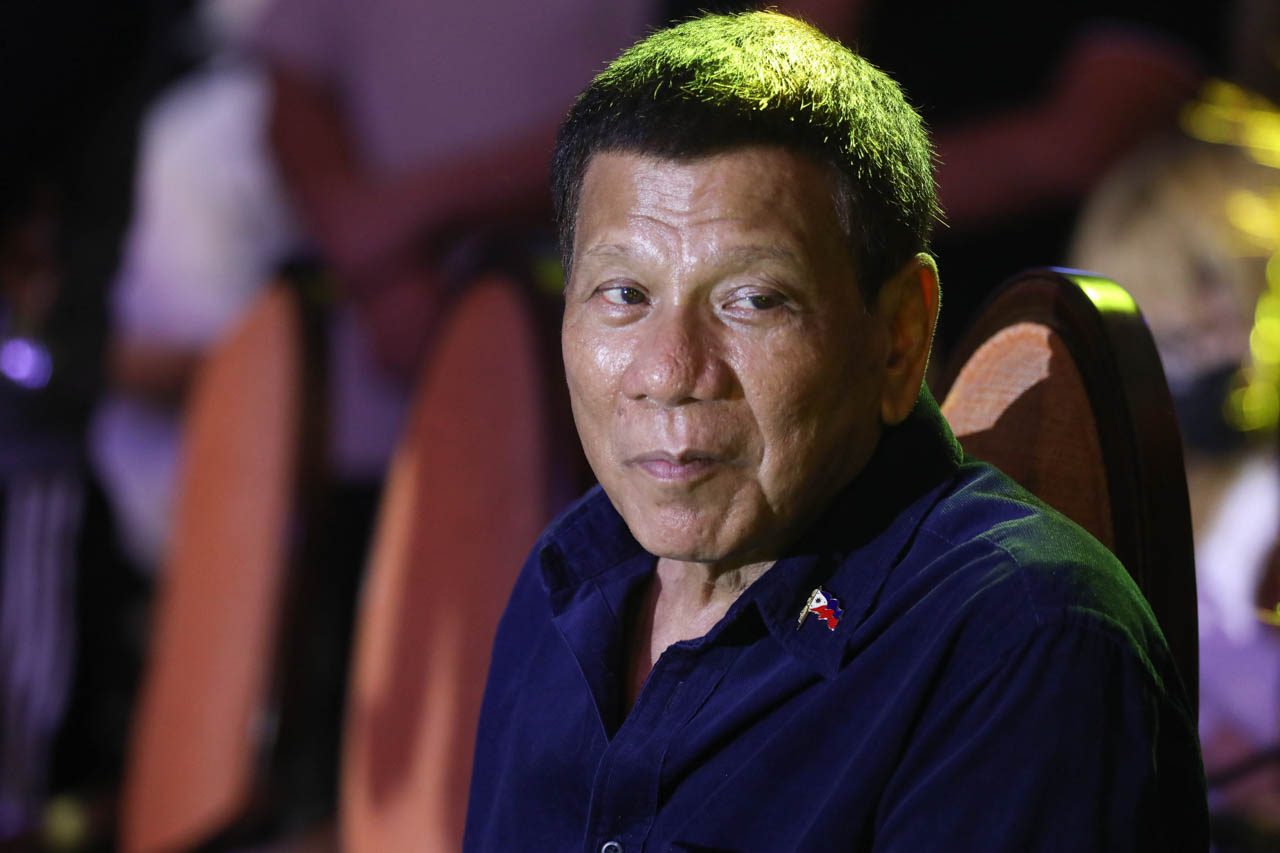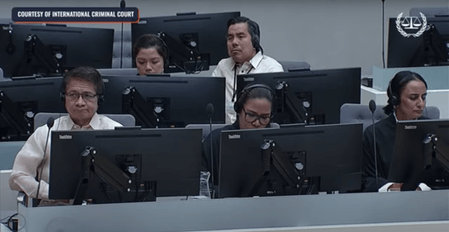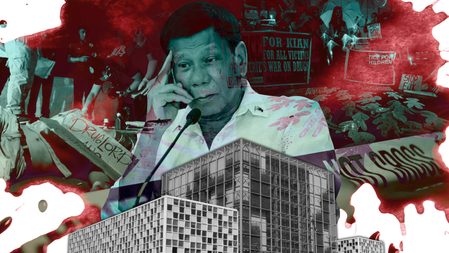SUMMARY
This is AI generated summarization, which may have errors. For context, always refer to the full article.

LONDON, England – The International Criminal Court (ICC) on Tuesday, July 18, junked the appeal of the Marcos government, essentially allowing the continuation of investigations into drug war-related killings in the country and the alleged death squad in Davao City under the leadership of former president Rodrigo Duterte.
Presiding Judge Marc Perrin de Brichambaut said the chamber decided by a majority, which found that “the pre-trial chamber did not err in law” as alleged by the Philippine government.
Three out of five judges decided to reject the appeal, saying that the challenge by the Philippine government has unclear details. The chamber clarified that the ruling is not a decision on jurisdiction. This will expectedly and theoretically give a small window to the Philippine government to argue further in the future.
Presiding Judge de Brichambaut of France and Judge Gocha Lordkipanidze of Georgia dissented. The majority who decided to reject the Philippine appeal are Judges Solomy Balungi Bossa of Uganda, Luz del Carmen Ibáñez Carranza of Peru, and Piotr Hofmański of Poland.
The Philippine government expected this decision, according to Solicitor General Menardo Guevarra who said beforehand that he was “not too sanguine about a favorable ruling.”
The Philippine government was represented in the ICC courtroom by Ambassador to the Netherlands J. Eduardo Malaya and external counsel, British barrister Sarah Bafadhel. The Philippine Office of the Solicitor General was lead in the case from Manila. Assistant Solicitor General Markk Perete was initially expected to speak to the press later today, but hours before the release of the ICC’s decision, it was announced that Assistant Solicitor General Myrna Agno-Canuto, head of the OSG War on Drugs Task Force, will speak instead.
This appeals chamber ruling is both big and small. Big, because if the chamber had granted the government appeal, the prosecutor would have closed the investigation which would effectively have ended five years of a process that many sectors, specifically victims, had pinned their hopes on. And small, because it just validates the process where it stands, which is the formal investigation that has been going on since September 2021. The preliminary examination started in February 2018.
What happens next is that Prosecutor Karim Khan and his team will continue investigating.
“The pre-trial chamber correctly assessed whether there exists an advancing process of domestic investigations within the situation which sufficiently mirrors that of the prosecutor. Taking into account the stage of the situation as well as the specific circumstances and parameters of the Philippines situation. Therefore, the majority finds that the pre-trial chamber did not err in law,” said Judge de Brichambaut.
“Mirroring” the prosecution addresses one of the main arguments of Prosecutor Khan that for the ICC to lose jurisdiction and step aside, the Philippine government must be able to show that it is looking at the “same person and same conduct” as the ICC itself.
Genuine investigation?
At this point, there is no absolute certainty that Duterte is the subject of the investigation. But all of the prosecutors’ reports have named him, and in some of them, even his former police chief and now senator, Ronald “Bato” Dela Rosa, in what they have described as “extrajudicial killings [that] appear to have been committed pursuant to an official State policy of the Philippine government.”
The day before the ICC decision, Duterte met with Chinese President Xi Jinping, according to Chinese state media. President Ferdinand Marcos Jr. said he was aware that the former president was making the trip to Beijing, which the Chinese foreign ministry appreciated as a “strategic choice…to “improve relations.”
Guevarra, who was Duterte’s justice secretary, filed an appeal with the appeals chamber citing the “functioning and independent criminal justice system” of the country. Under the Rome Statute, the ICC Prosecutor wouldn’t be able to pursue an investigation if the Philippine government is found to be willing and able to investigate the killings on its own.
The Office of the ICC Prosecutor – from the time of retired Fatou Bensouda to the current Khan – had said all throughout the process that it had found a lack of genuine investigation by the Philippine government. The ICC’s pre-trial chamber had agreed twice, which is why the process has reached the appeals stage.
The investigation is looking into the killings in the war on drugs from 2016 to 2019, which is when Duterte’s withdrawal from the Court took effect (March 2019), as well as the killings carried out by the alleged Davao Death Squad when Duterte was vice mayor and mayor of the city from 2011 to 2016.
The scope starts with 2011 because this is when the Philippines became a member of the ICC. The justice system has investigated and prosecuted very few of the estimated 27,000 killings in the drug war.

What happens now?
It would be up to Guevarra, and other strategists of the Marcos government, including diplomats, how best to respond to the ICC’s political and legal moves.
“This conclusion would not preclude the Philippine government from providing material in the future to show that it is conducting credible investigations and prosecutions that could warrant a deferral of the investigation to domestic authorities,” said Maria Elena Vignoli, senior counsel in the International Justice Program of Human Rights Watch.
The ICC investigation is a thorn in the fragile alliance of the Dutertes and President Ferdinand Marcos Jr.
While Marcos officially backs Duterte’s withdrawal of the Philippines from the Rome Statute, his government continues to participate in the process. In the middle of all that, Marcos, in the interviews he has granted, has acknowledged that there were “abuses by certain elements” in Duterte’s drug war.
Under the Rome Statute’s Article 82, the Philippine government may be able to file appeals from this point only in the following scenarios:
- The pre-trial chamber denies a request to release a person being investigated or prosecuted (the prosecutor can also appeal if the decision was to grant the release)
- The pre-trial chamber takes steps on its own without any requests from the prosecutor
- The pre-trial chamber authorizes the prosecutor to take investigative steps within Philippine territory even without the cooperation of the Philippines
If and when an arrest warrant is issued, the arrest will depend on the cooperation of countries. The Philippines, not being a member of the Rome Statute anymore, does not have a legal obligation to arrest the subject of a warrant. But when that person travels to another state party, he may be arrested and turned over to The Hague.
States parties, however, have not always been cooperative in these scenarios, going by past ICC cases. The arrest warrant against Putin poses the latest test of the strength of ICC mechanisms, as the Russian leader travels to South Africa, a state party, this August.
That the ICC is also pursuing Putin and Russia’s invasion of Ukraine could have implications on how much priority will be given to other cases like the Philippines.
“Unfortunately, there is currently a real mismatch between the Court’s workload and the resources available to it. In December, ICC member countries approved an increase to the Court’s annual budget, which barely covers costs associated with inflation and is far below what the Court had requested,” said Vignoli.
The Rome Statute allows the ICC to confirm charges even if the person or people have not been arrested. But a trial cannot be held in the absence of the accused.
“In the court’s previous investigations in cases in other countries, the time before any arrest warrants or summonses to appear were issued has ranged from a little less than two months to over six years,” said Vignoli.
It’s a long road ahead which the victims and their families have been warned about, but the ICC prosecutors, both old and new, have moved with relative speed on the Philippine case despite limited resources and what are deemed to be more urgent concerns such as the ongoing invasion of Ukraine.
Khan is familiar with the Philippines, having trained staff of the Philippine Commission on Human Rights (CHR) in 2018 before he became ICC prosecutor. The CHR has been the top advocate for victims of state abuses under Duterte, especially the drug war.
Khan and his office have continuously collected and preserved evidence throughout this now five-year process since Bensouda opened the preliminary examination in 2018. – Rappler.com
1 comment
How does this make you feel?





![[Just Saying] SONA 2024: Some disturbing points](https://www.rappler.com/tachyon/2024/07/TL-marcos-sona-points-july-23-2024.jpg?resize=257%2C257&crop=335px%2C0px%2C720px%2C720px)

![[OPINION] Rodrigo Duterte and his ‘unconditional love’ for China](https://www.rappler.com/tachyon/2024/04/rodrigo-duterte-xi-jinping-august-2019.jpeg?resize=257%2C257&crop=91px%2C0px%2C900px%2C900px)



![[The Slingshot] Lito Patay’s 4 hours and 38 minutes of infamy](https://www.rappler.com/tachyon/2024/07/Lito-Patay-4-hours-infamy-July-19-2024.jpg?resize=257%2C257&crop=233px%2C0px%2C720px%2C720px)




Firstly, thanks to the International Criminal Court (ICC) for junking
the above-stated appeal of the Marcos government. It was NOT
fooled by the government’s argument that there is a
“functioning and independent criminal justice system” in the
country. Functioning, perhaps, for the rich and powerful like
that of Teves, Bantag and Pastor Quiboloy. Independent?
Yes, independent, when Judges do not allow themselves to be
influenced by the President who has or had appointed them.
Secondly, the ICC investigation is, indeed, “a thorn in the fragile alliance of the Dutertes and President Ferdinand Marcos Jr.” This
alliance is getting more fragile and even “HOT”
as VP Sara Duterte is now included in the picture
(“VP Sara, 2 senators named in ICC
probe documents,” by ELLEN TORDESILLAS, VERA Files, July 17, 2023).
This could be used as a weapon by that Presidential Cousin who
wanted to be the next President of this country. And, more probably,
he is closer to the heart of his cousin PBBM, because the latter may secretly wanted to continue their Political Dynasty’s hold of the Highest Position of the Government – that is WITHOUT interruption and WITHOUT giving any chance to other Political Dynasties, too.